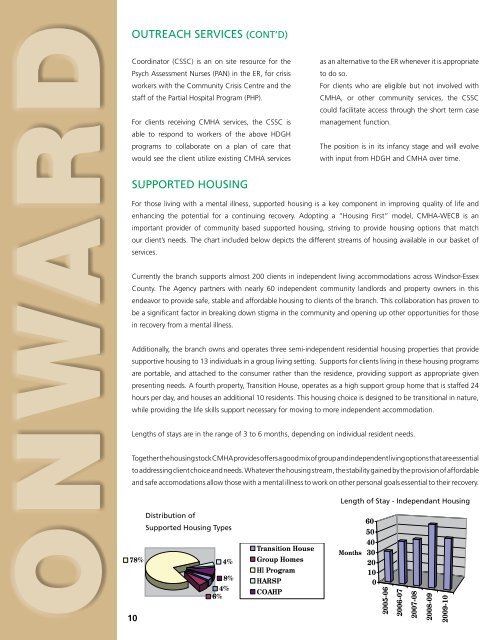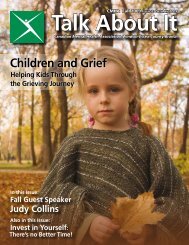2009/10 ANNUAL REPORT - Canadian Mental Health Association
2009/10 ANNUAL REPORT - Canadian Mental Health Association
2009/10 ANNUAL REPORT - Canadian Mental Health Association
You also want an ePaper? Increase the reach of your titles
YUMPU automatically turns print PDFs into web optimized ePapers that Google loves.
ONWARD<br />
Outreach Services (CONT’D)<br />
Coordinator (CSSC) is an on site resource for the<br />
Psych Assessment Nurses (PAN) in the ER, for crisis<br />
workers with the Community Crisis Centre and the<br />
staff of the Partial Hospital Program (PHP).<br />
For clients receiving CMHA services, the CSSC is<br />
able to respond to workers of the above HDGH<br />
programs to collaborate on a plan of care that<br />
would see the client utilize existing CMHA services<br />
Supported Housing<br />
For those living with a mental illness, supported housing is a key component in improving quality of life and<br />
enhancing the potential for a continuing recovery. Adopting a “Housing First” model, CMHA-WECB is an<br />
important provider of community based supported housing, striving to provide housing options that match<br />
our client’s needs. The chart included below depicts the different streams of housing available in our basket of<br />
services.<br />
Currently the branch supports almost 200 clients in independent living accommodations across Windsor-Essex<br />
County. The Agency partners with nearly 60 independent community landlords and property owners in this<br />
endeavor to provide safe, stable and affordable housing to clients of the branch. This collaboration has proven to<br />
be a significant factor in breaking down stigma in the community and opening up other opportunities for those<br />
in recovery from a mental illness.<br />
Additionally, the branch owns and operates three semi-independent residential housing properties that provide<br />
supportive housing to 13 individuals in a group living setting. Supports for clients living in these housing programs<br />
are portable, and attached to the consumer rather than the residence, providing support as appropriate given<br />
presenting needs. A fourth property, Transition House, operates as a high support group home that is staffed 24<br />
hours per day, and houses an additional <strong>10</strong> residents. This housing choice is designed to be transitional in nature,<br />
while providing the life skills support necessary for moving to more independent accommodation.<br />
Lengths of stays are in the range of 3 to 6 months, depending on individual resident needs.<br />
Together the housing stock CMHA provides offers a good mix of group and independent living options that are essential<br />
to addressing client choice and needs. Whatever the housing stream, the stability gained by the provision of affordable<br />
and safe accomodations allow those with a mental illness to work on other personal goals essential to their recovery.<br />
Distribution of<br />
Supported Housing Types<br />
78% 4%<br />
<strong>10</strong><br />
8%<br />
4%<br />
6%<br />
Transition House<br />
Group Homes<br />
HI Program<br />
HARSP<br />
COAHP<br />
as an alternative to the ER whenever it is appropriate<br />
to do so.<br />
For clients who are eligible but not involved with<br />
CMHA, or other community services, the CSSC<br />
could facilitate access through the short term case<br />
management function.<br />
The position is in its infancy stage and will evolve<br />
with input from HDGH and CMHA over time.<br />
Length of Stay - Independant Housing<br />
60<br />
50<br />
40<br />
Months 30<br />
20<br />
<strong>10</strong><br />
0<br />
2005-06<br />
2006-07<br />
2007-08<br />
2008-09<br />
<strong>2009</strong>-<strong>10</strong>






